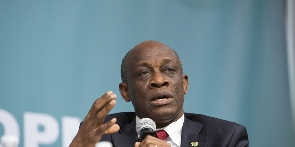Former finance minister Seth Terkper is of the view that as the International Monetary Fund (IMF) negotiation is still underway, is it crucial for government to strive for a solid and good programme and not necessarily a fast one. He said presenting a good programme is key to winning over the Fund and the necessary benefit there is for the economy. In a media dialogue, the former finance minister said securing funds from the IMF is a must, given the current economic challenges; hence the programme should be well-thought-through. “The global economy is becoming increasingly hostile, and I believe that given all we have been talking about, let us aim for a solid and good programme – making it slowly and not necessarily a fast one. One that can cover the nuts and bolts, otherwise it will come to haunt us; we might win the IMF and go back to where we were. Getting the programme is a must, otherwise things will go downhill. “I think the goal should be a thorough discussion of all issues, so that we have a good programme. A programme that will make us win over the Fund in a very substantive and more realistic manner. From my experience I think it has always taken us a minimum of six months, sometimes with lesser headaches, to negotiate the programme,” he said. He also called for transparency of data with the IMF to hasten approval of the programme. Speaking on concerns that government seems to be protecting its legacy and flagship programmes, he said that it will have to relent to allow for progress in the negotiations. Mr. Terkper further advised that there is a need to bring back some buffers and stabilisers and implement them so the country can fall back on them during difficult times. “We must stretch into the medium-term to bring back some of the buffers and stabilisers that have been ignored, like the Sinking Fund. We cannot continue borrowing without paying. We must look beyond austerity to build solid sector policies to boost job creation for growth,” he said. He also urged government to be open on issues with the citizenry to carry them along. “Even internally, there are things that are unknown to the Ghanaian populace. Do we know all the costs outside the budget? The Fund will want to know. Do we know things that are coming up,” he questioned. Enhanced Domestic Programme The Ministry of Finance and Bank of Ghana have commenced a comprehensive debt sustainability analysis with the IMF for a possible US$3billion support programme. Having reversed a policy of not seeking aid from the International Monetary Fund, government requested a balance of payment package following a serious economic crisis characterised by record-high inflation, currency depreciation and rising food prices. The proposed programme should span a minimum of three years and seek to achieve the following objectives: strengthen government’s efforts to restore investor confidence in the economy, thereby regaining market access, boosting development partner disbursements and unlocking other financing sources; restore debt sustainability and macroeconomic stability to support green growth, economic transformation and job creation while protecting social spending.
Business News of Friday, 21 October 2022
Source: thebftonline.com
IMF negotiations: Government must aim for good programme not fast one – Terkper
Entertainment
















